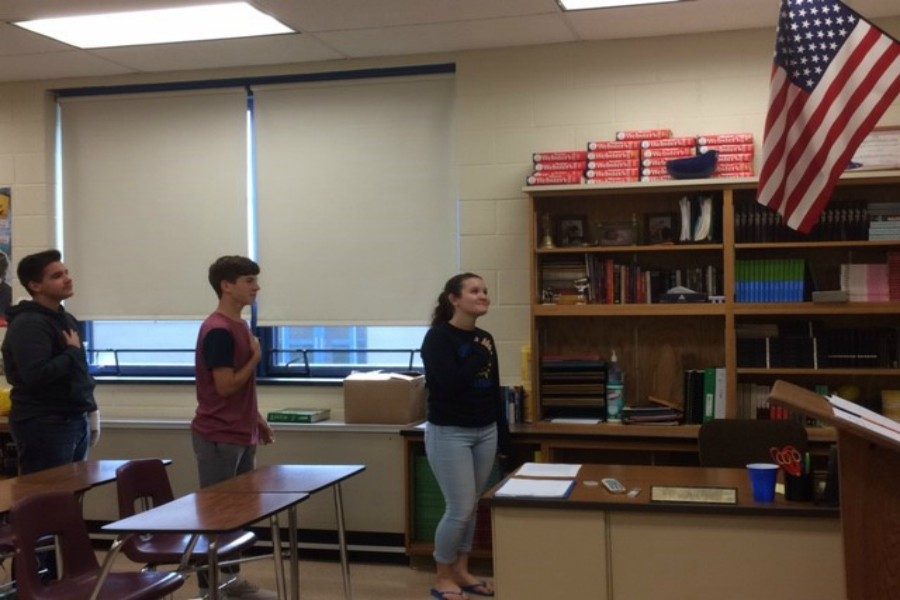Taking a pass on the pledge
Students now have the right to refuse to recite the Pledge.
Each morning at B-A students are invited to stand for the Pledge of Allegiance.
October 3, 2016
In schools all across America, students have a choice in whether or not they want to say the pledge. Some people are all for this, but others think we should have to stand during the saying of the Pledge to show respect.
Of the 50 states, not including the 3 territories, 40 require public school students to recite the Pledge of Allegiance.
Recently at Needville High School in Texas, fifteen-year old sophomore Mason Michalec was given a two day in-school suspension for refusing to stand for the pledge. He said he refused to stand because of his opposition to government spying. After his punishment the principle warned him that he would face more suspensions if he didn’t stop his protest.
Some of the small town’s residents think the school made the right decisions, but others think Mason had the right to sit.
The BluePrint wanted to see how Bellwood-Antis feel about sitting out during the Pledge.
“I’ve had kids not say the pledge, but they have all stood,” said Mrs. Dawn Frank, a high school math teacher. “I believe standing shows respect for all who have protected and continue to protect our American freedoms. Yes, I think all people have the choice to stand or not stand, but I don’t have to respect the person who decides to sit.”
Some teacher said there shouldn’t even be an option.
High School science teacher Mr. John Goodman said, “No, students should not be able to choose if they stand or sit for the pledge; they should be respectful of those who want to say the pledge uninterrupted.”
Mr. Matt McNaul, the civics teacher, said the key was for protesters to stop short of interrupting the pledge for others who choose to say it.
“Every student in my eight years teaching has stood for the pledge,” said Mr. McNaul. “I think students should have a choice to stand or sit for the pledge. I try to reinforce student expressions of speech as long as it doesn’t interfere with another student’s freedom.”
English teacher Mr. Naylor agreed.
“I wouldn’t necessarily like it if a student sat for the pledge, but I would respect the decision. I think the key is that the protest is respectful of others who are saying the pledge and not a disruption,” he said.







Caelan Mills • Oct 4, 2016 at 10:33 pm
Any kid who goes to school (regardless of their religion) SHOULD have stand for the flag. That flag represents our freedoms and rights that millions have died for in the name of our country to defend those rights; and you want to disrespect the millions of soldiers who are fighting right now just because you want to make a statement?! The rights and freedoms we have are NOT like the rights and freedoms in other countries like England. For example; how many countries let you speak your mind without getting into trouble? My whole point is, if you live in America and Don’t respect the symbol of freedom for these country, then why do you live here? And that applies to EVERYONE who has not stood for the flag like the kid in the article or Colin Kappernick (or whatever that sad, oppressed gentleman calls himself.)
Caelan Mills • Oct 4, 2016 at 10:35 pm
*this country